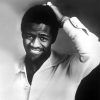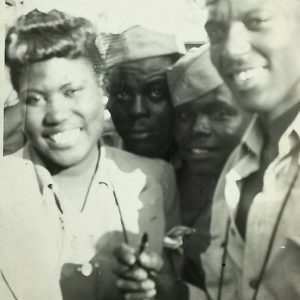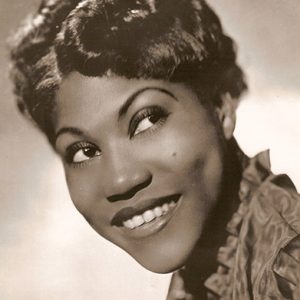calsfoundation@cals.org
"Sister Rosetta" Tharpe (1915–1973)
aka: Rosetta Nubin Tharpe
Arkansas native Rosetta Nubin Tharpe was one of gospel music’s first superstars, the first gospel performer to record for a major record label (Decca), and an early crossover from gospel to secular music. Tharpe has been cited as an influence by numerous musicians, including Bob Dylan, Little Richard, Elvis Presley, and Arkansan Johnny Cash.
Rosetta Tharpe was born in Cotton Plant (Woodruff County) on March 20, 1915, to Katie Bell Nubin Atkins—an evangelist, singer, and mandolin player for the Church of God in Christ (COGIC)—and Willis Atkins. She went by the first names Rosa, Rosie Etta, and Rosabell, and used both her father’s last name and her mother’s maiden name, Nubin. She began performing at age four, playing guitar and singing “Jesus Is on the Main Line.” By age six, she appeared regularly with her mother, performing a mix of gospel and secular music styles that would eventually make her famous. As a youth, she could sing and keep on pitch and hold a melody. Her vocal qualities, however, paled beside her abilities on the guitar—she played individual tones, melodies, and riffs instead of just strumming chords. This talent was all the more remarkable because, at the time, few African American women played guitar.
Her guitar style was influenced by her mother’s mandolin playing and by pianist Arizona Dranes. She also sang the popular hymns of the day, including the compositions of bluesman turned gospel musician Thomas A. Dorsey. Indeed, elements of the blues are readily apparent in her guitar styling. Later, her music would be influenced by her work with jazz greats Lucky Millinder and Cab Calloway.
Billed as the “singing and guitar-playing miracle,” she was an added attraction at her mother’s church services. Both mother and daughter worked as members of an evangelistic troupe that worked throughout the South before arriving in Chicago, Illinois, in the late 1920s. There they became part of the growing Holiness movement, a late nineteenth-century offshoot of the Pentecostal denomination which, in the 1890s, led to the formation of COGIC and other new religious groups.
After several years of working with her mother and on the advice of several Chicago promoters, Rosetta Nubin moved to New York in the mid-1930s. She married minister Thomas A. Tharpe in 1934. After their divorce, which was finalized in 1943, Rosetta kept the last name for use as her stage name. Later, in the 1940s, Tharpe was married a second time, to promoter Fosh Allen.
Tharpe was signed to Decca Records in 1938 and was successful immediately. Versions of Thomas A. Dorsey’s “This Train” and “Hide Me in Thy Bosom,” released as “Rock Me,” were smash hits featuring Tharpe on guitar and Lucky Millinder’s jazz orchestra as accompaniment. These releases started a trend for Tharpe, who recorded both traditional numbers for her gospel fan base and up-tempo, secular-influenced tunes for her growing white audience.
The popularity of her singles led to Tharpe’s inclusion in John Hammond’s Black music extravaganza, “From Spirituals to Swing,” held in Carnegie Hall in New York City on December 23, 1938. After this well-publicized event, Tharpe went on a concert tour throughout the northeast. She also recorded with Cab Calloway to some success but fared better with “Trouble in Mind,” “Shout, Sister, Shout,” and “That’s All”—all recorded with Lucius “Lucky” Millinder’s jazz orchestra in 1941 and 1942. Tharpe’s popularity was so great that she was only one of two Black gospel acts—the other was the Dixie Hummingbirds—to record “V-Discs” for U.S. troops overseas. In the late 1940s, Tharpe returned to more strictly religious songs, recording “Didn’t It Rain” (1947) and “Up Above My Head” (1947) with Marie Knight. From 1944 to 1951, her main accompanist was Samuel “Sammy” Blythe Price, a boogie-woogie pianist from Texas. His trio backed her on “Strange Things Happening Every Day,” a top ten “race record.”
Tharpe continued her success in the religious market. Such was Tharpe’s popularity that on July 3, 1951, reportedly as many as 25,000 people paid to witness Tharpe’s third marriage to Russell Morrison, her manager, in a ceremony held at Washington DC’s Griffith Stadium. While her marriages to men were a matter of public record, it is widely accepted that Tharpe also had relationships with women.
Tharpe and Marie Knight parted ways after unsuccessfully trying to enter the blues music market. As a result of the foray into the pop music market, Tharpe’s popularity waned; soon her concert dates dropped off, and she lost her recording contract with Decca. Tharpe kept working and had signed with Mercury Records by the late 1950s. She first toured Europe in 1957 and made return trips in the 1960s, making several live recordings while overseas. Although she never realized her comeback, Tharpe continued to perform. A stroke in 1970 necessitated a leg amputation and caused speech difficulties, but it merely slowed her down. Tharpe continued to tour and perform until her death in Philadelphia, Pennsylvania, on October 9, 1973.
Tharpe’s music and influence continue years after her death. Her songs have been recorded by Elvis Presley, and Johnny Cash spoke of her impact on his music. In 1998, the U.S. Postal Service issued a Rosetta Tharpe postage stamp. In 2003, the album Shout, Sister Shout: A Tribute to Sister Rosetta Tharpe was released, with versions of Tharpe’s songs performed by female artists including Maria Muldaur, Odetta, and Marcia Ball. She was inducted into the Arkansas Black Hall of Fame in 2012. In 2013, the PBS series American Masters featured an episode on Tharpe, and she was inducted into the Arkansas Entertainers Hall of Fame. Act 810 of 2017 designated Highway 17 from Cotton Plant to Brinkley (Monroe County) the Sister Rosetta Tharpe Memorial Highway. In 2018, Tharpe was inducted into the Rock and Roll Hall of Fame in the Early Influence category, with Brittany Howard of Alabama Shakes performing two of Tharpe’s hits at the induction ceremony in Cleveland, Ohio. On October 20, 2022, a mural honoring Rosetta Tharpe was dedicated in downtown Little Rock (Pulaski County). An exhibition of artifacts and photographs at the Smithsonian National Museum of African American History and Culture in Washington DC, Spirit in the Dark: Religion in Black Music, Activism, and Popular Culture, on display from November 2022 to November 2023, included Tharpe. In October 2023, Tharpe was listed as number six on Rolling Stone magazine’s list of the 250 greatest guitarists of all time.
Musician Yola portrayed Tharpe in the 2022 movie Elvis, directed by Baz Luhrmann. In March 2023, Variety reported that musician Lizzo would be playing Tharpe in the upcoming biopic Rosetta. In May 2025, Deadline reported that director Aunjanue Ellis-Taylor and musician and producer Mick Jagger had teamed up for their own feature-length film on Tharpe, as well as a companion documentary.
For additional information:
“The 250 Greatest Guitarists of All Time.” Rolling Stone, October 13, 2023. https://www.rollingstone.com/music/music-lists/best-guitarists-1234814010/sister-rosetta-tharpe-1234814264/ (accessed October 23, 2023).
Boyer, Horace Clarence. The Golden Age of Gospel. Urbana: University of Illinois Press, 2000.
Cash, Rosanne. “The Godmother of Soul.” Oxford American (Winter 2020). https://www.oxfordamerican.org/magazine/item/1980-the-godmother-of-soul (accessed May 15, 2023).
Harvey, Paul. Southern Religion in the World: Three Stories. Athens: University of Georgia Press, 2019.
Jackson, Jerma. Singing in My Soul: Black Gospel Music in a Secular Age. Chapel Hill: University of North Carolina Press, 2000.
Martin, Philip. “Washed in the Blood: Rosetta Tharpe.” Arkansas Democrat-Gazette, April 21, 2024, pp. 1E, 4E. Online at https://www.arkansasonline.com/news/2024/apr/20/washed-in-the-blood-rosetta-tharpe/ (accessed April 23, 2024).
McArdle, Terence. “Amazing Base: A Singer Wed in a D.C. Ballpark, and 19,000 Paid to Attend.” Washington Post, May 7, 2023. https://www.washingtonpost.com/history/2023/05/07/rosetta-tharpe-wedding-music-dc/ (accessed May 15, 2023).
McGinley, Paige A. Staging the Blues: From Tent Shows to Tourism. Durham, NC: Duke University Press, 2014.
Wald, Gayle F. Shout, Sister, Shout!: The Untold Story of Rock-and-Roll Trailblazer Sister Rosetta Tharpe. Boston: Beacon Press, 2007.
———. “Sister Rosetta Tharpe: Remembering Rosetta.” Living Blues 34 (November–December 2003): 106–113.
William K. McNeil
The Ozark Folk Center
Terry Buckalew
Helena, Arkansas
This entry, originally published in Arkansas Biography: A Collection of Notable Lives, appears in the CALS Encyclopedia of Arkansas in an altered form. Arkansas Biography is available from the University of Arkansas Press.


 "Rock Me," Performed by Sister Rosetta Tharpe
"Rock Me," Performed by Sister Rosetta Tharpe  "Sister Rosetta" Tharpe
"Sister Rosetta" Tharpe  "Sister Rosetta" Tharpe
"Sister Rosetta" Tharpe 



I think it’s worth noting that Sister Rosetta’s 1944 release of “Strange Things Happening Every Day” is credited by some as the first rock ‘n’ roll record. She was also known as the “Godmother of Rock ‘n’ Roll.”
The burgeoning British rock-and-roll scene of the early 1960s benefitted many of the pioneering African-American gospel/blues singers, as they were often credited as influences by the young, roots-based rockers. This latter-day acclaim resulted in increased tour bookings, both domestically and overseas, for artists such as Sister Rosetta Tharpe. These performances were received enthusiastically by a new generation of music fans.
A television performance shows her singing one of her signature songs, Didnt It Rain, Children, at the Chorltonville Train station in Manchester, England, on August 19, 1964.